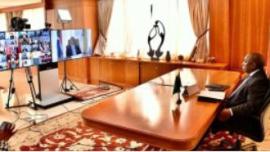
President Cyril Ramaphosa has positioned South Africa as an attractive investment destination, with the most advanced and diverse economy in sub-Saharan Africa and strong, well-regulated financial markets.
The President was addressing the 11th annual SA Tomorrow and SA Macro Investment conference in New York City, hosted by the Johannesburg Stock Exchange (JSE) and its co-sponsors Standard Bank, Old Mutual, and UBS.
The conference took place on 28 and 29 October 2024.
“South Africa has a great deal to offer as an investment destination. We are the most advanced, diverse economy in sub-Saharan Africa. South Africa has deep and well-regulated capital markets. We also have a mature financial and services sector and strong and functioning institutions,” the President said in his virtual address.
The conference was aimed at showcasing South African institutions and listed companies to the US investor community, offering deeper insights into South Africa’s investment potential.
This year’s conference has attracted considerable interest, driven by the formation of the new Government of National Unity (GNU) and the influence it will have on policy and fiscal management.
The gathering brought together investors, policymakers, and business leaders to discuss the future of South Africa's economy and investment opportunities.
Open for investment
President Ramaphosa told the delegates that South Africa was open for investment in industries as diverse as financial services and advanced manufacturing, energy and healthcare infrastructure and mining.
“We are developing the value chains of the future. With substantial reserves of critical minerals, we aim to be at the forefront of the green energy revolution.
“We have a competitive advantage in the production of sustainable energy technologies, renewable energy components, green hydrogen and many others,” the President said.
President Ramaphosa said the conference took place at an important time, as the country enters a new era of optimism and progress.
The President noted that it was just over a 100 days since the Government of National Unity was formed following successful elections in May.
The new government took office with three strategic priorities to drive inclusive growth and job creation, to reduce poverty and tackle the high cost of living and to build a capable, ethical and developmental state.
Addressing pressing challenges
Against the backdrop of poor economic performance over the past 15 years and subdued investment, President Ramaphosa said government was working with partners across society to create the conditions for growth and jobs.
A year ago, a partnership between government and business was established to tackle some of the most immediate challenges facing the economy. Through a government-wide initiative known as Operation Vulindlela – meaning ‘to open the way’ – government has been driving structural reforms to unleash growth and create jobs.
“Working with partners in business and labour, we have made tremendous progress in stabilising the country’s electricity supply. Through regulatory reforms, we have driven massive private sector investment in renewable energy.
“We have established the legislative and institutional framework for a more competitive and sustainable energy market. We have undertaken immigration reform to attract more skilled workers and tourists.
“We are opening up our rail network and port infrastructure for participation by third party operators, meaning the private sector,” the President explained.
President Ramaphosa further highlighted that government was working with business and relevant agencies to implement the recommendations of the Financial Action Task Force (FATF) to remove South Africa from its grey list.
The FATF grey list refers to the FATF’s practice of publicly identifying countries with strategic AML/CFT deficiencies. The FATF maintains two such lists with one being jurisdictions under “increased monitoring” that are actively working with the FATF to address strategic deficiencies in their regimes” and secondly “high-risk jurisdictions subject to a call for action” that are not actively engaging with the FATF to address these deficiencies.
“The Government of National Unity is committed to sound macroeconomic policies that support inclusive growth, stability and development,” he said.
G20
Next year, South Africa assumes the Presidency of the G20 under the theme: “Solidarity, Equality and Sustainable Development”.
The President said the country will use its G20 Presidency to advocate for increased investment on the African continent and across the countries of the Global South.
“We will continue to promote a global economic order that is inclusive and fair. We will continue to work with our partners to achieve shared and sustainable prosperity for all countries,” the President said.
The President further highlighted that the last few months has seen a renewal of investor interest in the South African economy. This has been prevalent in both the local market and offshore.
“The message I bring to investors today is that this interest is well-placed. South Africa is firmly on the road to recovery.
“Investments in South Africa are secure. Our business environment is stable. This is supported by policy certainty and regulatory safeguards that we have. In many ways, South Africa is open for business. Together, we can forge a path to shared success, prosperity and progress,” the President said.
South Africa will assume the G20 Presidency from 1 December 2024. – SAnews.gov.za


